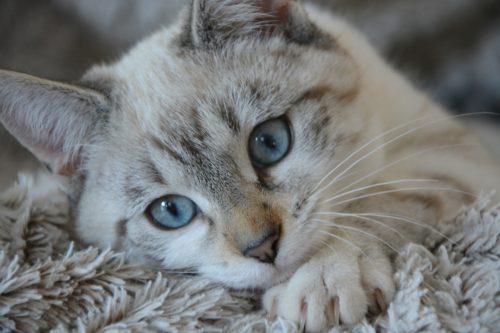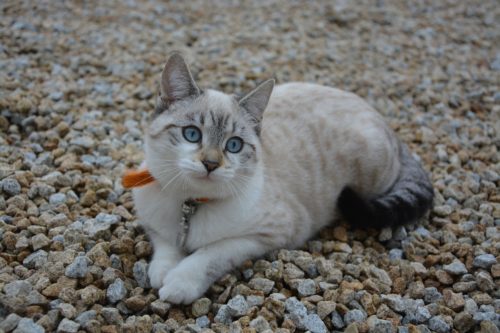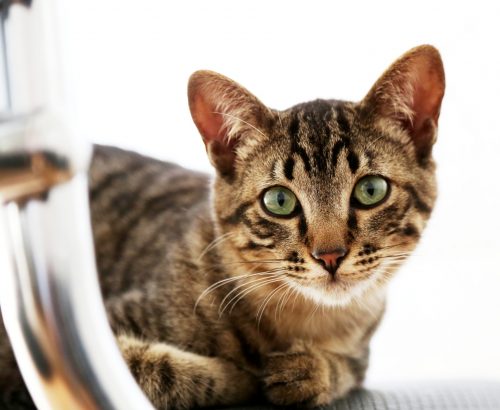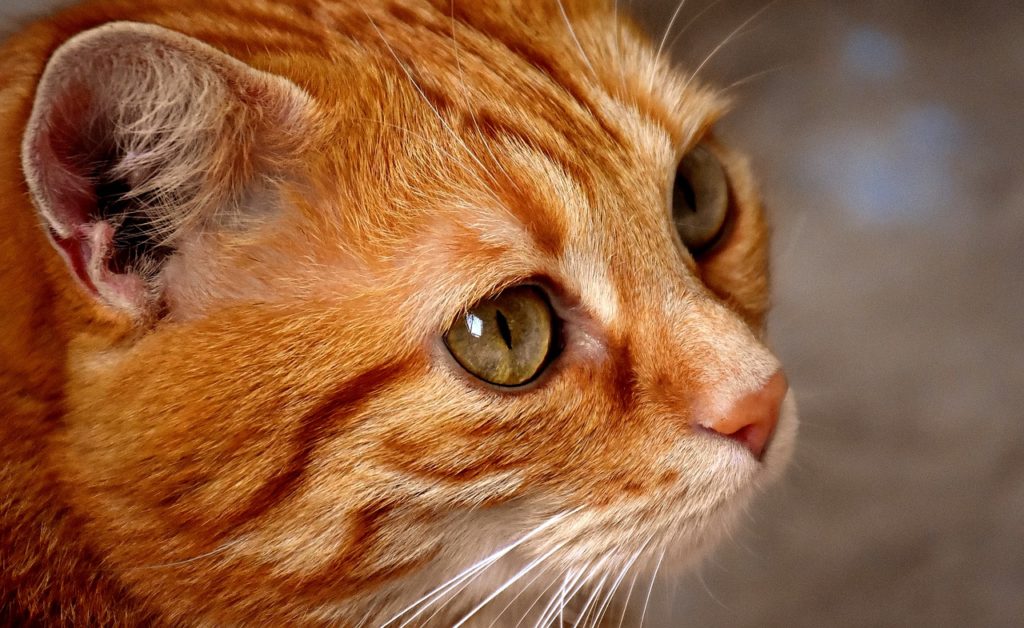Has your cat been urinating on your walls or living room furniture? Unfortunately, one of the biggest complaints of all cat owner’s occurs when their furry feline begins “marking” up their territory or peeing in places other than their litter box. While this may be frustrating for you, it’s crucial that you know that this behavior may be an indication of a much larger issue at hand.
In most cases, people often associate cat spraying with unneutered male felines who feel the need to mark their territory due to their build-up of hormones. But this is just one factor. Unfortunately, any cat at any age and in any breed can begin to spray.
Often times, cats will start this behavior to communicate something to their owners or other household animals. If your furry friend begins to adopt these actions, do not scold him or stress him out in any way for this will only escalate the issue.
If your cat has been spraying and you don’t know what it is or why it’s happening, don’t worry, you have come to the right place. This article will cover everything you need to know on this topic and what you can do to stop this issue. As with most behavioral problems, the sooner you are able to uncover the source of the issue, the faster you will be able to get your cat feeling as good as new.
What is Cat Spraying?
Before diving into the causes and treatment of cat spraying, it’s critical that you first understand what this behavior is and why it occurs. For starters, the generalized definition of cat spraying is any form of inappropriate urination. Many owners will see their cat peeing on walls, couches, or any other area your cat can access.
In most cases, you can tell that a cat is about to spray because they will back up to a vertical space, erect their tail, lean forward, and urinate. Some cats will even shake or quiver while they are spraying. Owners can tell the difference between a spray and regular urination because a cat will only urinate a small amount when they are spraying. As you can see, this behavior seems to be deliberate, unlike normal bathroom tendencies that seem to be more natural.
Cat spraying can be caused by many underlying factors, some more serious than others. Depending on what internal turmoil is inflicting your companion, he may begin to perform this behavior to communicate that he is feeling a certain way. Whether they are anxious or in pain, inappropriate urination is a popular form of communication cats depend on.
Often times, cat spraying can also be caused by other animals within the household. If your cat is not suffering from any kind of illness, they may develop some form of anxiety due to new animals brought into the home or even if they spot a stray cat lingering in their territory outside.
In instances where the cat is feeling threatened by a new pet, you can expect him to be spraying all throughout the house trying to claim what’s rightfully his (or so he thinks). He feels threatened and that his environment is changing, which can lead to stress and anxiety. If the problem is from an outdoor cat intruding on his space, your cat will spray windows, doors, and other areas that are close to the outside area.
Another less serious issue that causes cats to spray is their litter box. Think about it, if their litter box hasn’t been cleaned in weeks or is in a hard to reach place do you really think they are going to enjoy doing their business there? Probably not. That’s why it is critical that their litter box is in an easily accessible place and cleaned on a regular basis. If there are multiple cats within the household, it is highly advised to have more than one litter box so they do not have to fight for their space.
If your cat begins to spray after a big move or a change in their environment, that is probably because he is feeling stressed as well. Cats like to be in control of their life and any situation that concerns them, so when they suddenly move to a new location or their daily schedule has been modified in any way, they may begin to panic. To avoid this from happening, try to make him feel as comfortable as possible and re-establish a sense of normalcy.
What Health Issues Cause Cats to Spray?
If the problem isn’t due to other animals or new pets within the home, that usually means there is a deeper issue at hand. Unfortunately, inappropriate spraying can also point to several health problems involving the bladder. Often, uncontrollable urination or problems with urination will be mistaken for spraying. That’s why it is paramount that you are able to spot the difference between these behaviors and seek help from a professional when necessary. Some potential health problems that may inflict your furry companion can include the following:
Bacterial bladder infection
The bladder is a vital organ that stores urine within the body. Once an infection occurs, the bladder will become inflamed and will not be able to perform regular functioning. When a cat is suffering from this type of ailment, they will have the constant urge to urinate, have blood in their urine, strain while urinating, or have foul-smelling urine that is different than usual.
If your cat is suffering from a bladder infection, professional assistance will be the only way they can be healed. Once you take them in for a thorough examination, your vet will be able to run a series of tests and study the overall state of their bladder. Vets may also take a urine sample and sent it to the lab to see what kind of bacteria is inflicting your furry friend.
Hypothyroidism
Hypothyroidism in cats is caused by a deficiency in thyroid hormones. Although rare, cats with this condition have an insufficient amount of thyroid hormones that are needed for regular body functioning. If a cat has this problem, they will show signs of lethargy, weight gain, spraying, weakness, inactivity, and a change in coat health.
If your cat has been exhibiting any of these symptoms above, take him to the vet for further testing. Fortunately, this condition in cats can be cured by taking a synthetic hormone pill for the duration of their life. Once diagnosed and medicine prescribed, your cat’s symptoms should lessen relatively quickly.
Urinary Incontinence
When a cat is suffering from urinary incontinence, they are unable to control their bladder and will, therefore, have accidents around the house. Although this happens most often with older cats, urinary incontinence can affect any cat and any breed. Other common causes of this condition include damage to the bladder, obesity, brain damage, or even an underdeveloped bladder.
Symptoms to look out for includes urinary tract infections, wet spots on their bedding, urine leakage, an inflamed area around the genitals, and damp hair around their lower abdomen. If you notice any of these symptoms, it is highly advised to speak with a professional. If there is a more significant issue at hand, your vet will need to treat this problem first in order for your cat to be free of his symptoms.
Feline lower urinary tract Disease (FLUTD)
FLUTD can affect both the bladder and the urethra, causing a number of different symptoms to inflict your furry companion. Although from the outside it seems quite similar to a bladder infection, FLUTD is used to describe bladder inflammation. Common symptoms that can be seen with this disease can include bloody urine, frequent urination or straining, prolonged squatting, or urinating in inappropriate areas.
Many believe that stress is the main culprit for FLUTD. As you have recently covered, stress can be the result of a change in diet, a change in an environment, or any other external factors that are causing them mental instability. If the issue is not caused by stress, it is possible that an obstruction is blocking their pathways. If this is the case, your cat should be brought to the veterinarian immediately for this is a serious situation.
Increased urine production
Many health conditions can cause your cat to overproduce urine, thus needing to go more often. If your cat has an excess amount of urine compared to normal, they will most likely have accidents around the house. A few conditions that can cause an increased production of urine can include diabetes, liver disease, kidney infection, or total kidney failure.
Unlike some of these other causes, if your cat has an excess amount of urine he will not have a difficult time expelling it from his body. You will just notice that he is going more often than usual. Other signs to look out for when dealing with more serious health conditions include a change in weight, loss of appetite, lethargy, and poor coat health.
How to Get Your Cat Not to Spray
As you can see because there are so many causes, there is no one clear answer as to how you will be able to get them to stop. The first order of business is to uncover why they are performing the act in the first place. The easiest way to do this is by studying their environment and seeing if anything has changed or is causing them stress.
Did you recently move? Did the neighbors just get a nosey cat? Have you recently changed your cat’s litter to a scented one and now they don’t want to use it? These are some of the basic questions that need to be addressed before you can get your cat to stop spraying.
If your cat has not been spayed or neutered, you might want to consider doing so. Cats that have not had these procedures are more likely to spray their surrounding environment due to a build-up of hormones. If you know 100% that your cat is spraying and is not having a bladder issue, this could be the issue.
For cats that have recently adjusted to a new environment, try offering them new toys to play with which will help to distract them. They will also feel more comfortable in their space and hopefully eliminate their spraying habit once and for all. If your cat has been significantly affected by a change in schedule, try establishing a new routine that provides specific feeding times and play times each day.
If your furry companion continues to mark a particular space, that could mean that area is causing him stress. If that’s the case, try to associate that area with a more positive experience. You can do this by playing with your cat or socializing with him in that specific area. This technique should help him feel more at ease and hopefully less stressed.
In order to prevent your cat from remarking a specific area, make sure to clean the soiled spot with an enzymatic cleaner that is specific for eliminating odors. Once you have thoroughly sanitized the area, use a feline pheromone spray which will help to calm them down.
In the case that your cat’s inappropriate urination is due to a health problem, the best thing you can do is to take them to the vet for a complete examination. From there, the vet will be able to run a series of tests to uncover the underlying issue that is causing their problems. If your cat has a kidney stone or any other obstruction, they will need immediate attention by a professional. Once your vet has come up with a specific diagnosis, they will be able to recommend a catered treatment plan to get your cat back to normal.
If your cat has been acting strange and is urinating around the house, do not brush it off until the issue has escalated. The sooner you are able to uncover the underlying issue, the faster you will be able to treat and heal your furry friend.




